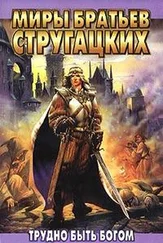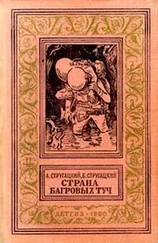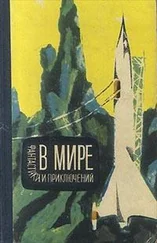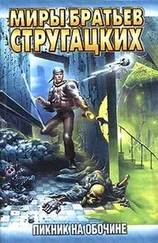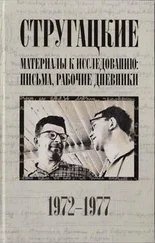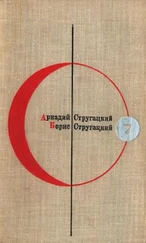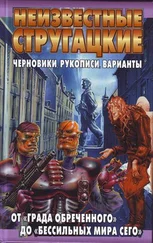“No,” said Maxim, “don’t torment yourself like that. I’m not tormenting myself—I’m sorry, what’s your name?”
“Call me Rudolf.”
“Yes… I’m not tormenting myself, Rudolf. And I don’t intend to. I intend to work. And make a revolution.”
“You’d better intend to go home,” said Wanderer.
“I am home,” Maxim impatiently said. “Let’s not talk about that any more… I’m interested in the mobile radiation emitters. What can be done about them?”
“Nothing has to be done about them,” Wanderer replied. “You’d do better to think about what can be done about inflation.”
“I’m asking about the radiation emitters,” said Maxim.
Wanderer sighed. “They work on batteries,” he said. “And they can only be recharged at my institute. In three days’ time they’ll croak… But in a month’s time an invasion is due to begin. Usually we manage to throw the submarines off course so that only a few of them reach the coast. But this time they’re assembling an armada… I was counting on the depressive radiation, but now we’ll simply have to sink them…” He paused for a moment. “So you’re at home, are you? Well, let’s suppose you are… Then what precisely do you intend to do now?”
They were already approaching the department. The heavy gates were tightly closed, and there were black gun ports that Maxim had never seen before in the stone wall. The department had become like a fortress, ready for battle. But three men were standing in front of the pavilion, and Zef’s ginger beard blazed as brightly as an exotic flower among the greenery.
“I don’t know,” said Maxim. “I’m going to do what well-informed people tell me to do. If I have to, I’ll deal with inflation. If I have to, I’ll sink submarines… But I know my most important task now: as long as I’m alive, nobody will ever be able to build another Center. Not even with the very best intentions in the world.”
Wanderer didn’t say anything to that. The gates were very close now. Zef scrambled through the hedge and walked out into the road. His automatic rifle was hanging behind his shoulder, and it was obvious from a distance that he was angry, and now he would start cursing and demanding explanations for why, massaraksh, they had dragged him away from his work, filled his head with all sorts of nonsense about Wanderer, and left him hanging around here among the flowers for more than an hour like a little kid.
AFTERWORD
BY BORIS STRUGATSKY
It is known with absolute certainty when this novel was conceived—on June 12, 1967, the following entry appeared in our work journal: “We need to compose a proposal for an optimistic story about [first] contact.” And immediately thereafter:
We have composed the proposal. The story The Inhabited Island . The plot: Ivanov crash-lands. The situation. Capitalism. Oligarchy. Control via psychowaves. Sciences only utilitarian. No progress. The machine is controlled by votaries. A means of ideal propaganda has just been discovered. Unstable equilibrium. Infighting in the government. The people are pulled from one side to the other, depending on who can reach the button. The psychology of tyranny: What does a tyrant want? It’s not push-button power; what’s wanted is sincerity, great deeds. There is a percentage of the population on whom the rays have no effect. Some of them eagerly strive to join the oligarchs (the oligarchs are also not susceptible). Some of them flee to the underground to avoid elimination as recalcitrant material. Some of them are revolutionaries like the Decembrists and the Narodnik populists. Following trials and tribulations Ivanov finds himself in the underground.
It is curious that this emphatically cheerful entry is situated precisely between two profoundly somber ones—06/12/67: “B. has arrived in Moscow in connection with the rejection of TоТ by Detgiz”; and 06/13/67: “Offensive snub at Young Guard with TоТ.” [1] TRANSLATOR’S NOTE: “B.” is Boris Strugatsky; “ToT” is the Strugatsky novel Tale of the Troika . “Detgiz” is Detskoe Gosudarstvennoe Izdatelstvo , the State Publishing House for Children’s Literature, and Young Guard is Molodaya Gvardiya, another Russian publishing house.
This double blow stunned us, uncoupling us from reality for a while. We were left, so to speak, in a state of “artistic punch-drunkenness.”
I remember very clearly how, discouraged and angry, we said to each other, “Ah, you don’t want satire? You don’t need Saltykov-Shchedrins any longer? Contemporary problems no longer perturb you? Aaall right! You’ll get an empty-headed, harebrained, absolutely toothless, entertaining novel about the adventures of spunky kid, a twenty-second-century Young Communist…” We humorous lads seemingly intended to punish someone among the holders of power for rejecting the serious themes and problems we were offering. Punish Comrade Farfurkis with a frivolous novel! Laughable. It is laughable and a little embarrassing to remember it now. But at that time, in the summer and autumn of 1967, when all the editorial offices who were friendliest to us had, one after another, rejected Tale of the Troika and Ugly Swans , we failed to see anything amusing in what was happening.
We set about The Inhabited Island without enthusiasm, but very soon the work enthralled us. It turned to be a damned thrilling occupation—writing a toothless, strictly entertaining novel! Especially since quite soon it stopped seeming so very toothless to us. The radiation towers, and the degenerates, and the Battle Guards—everything fell into place like cartridges slipping into the magazine, everything found its prototype in our adorable reality, everything proved to be a vehicle for a subtext. Moreover, it happened quite regardless of our will, seemingly of its own accord, like the multicolored candy crumbs in some magical kaleidoscope that transforms chaos and a random mishmash into an elegant, coherent, and entirely symmetrical little picture.
It was splendid, inventing a new, fantastic world—and it was even more splendid endowing it with highly familiar attributes and various realia. I’m looking through the work journal at the moment: November 1967, the Komarovo Writers’ House, we only worked during the day, but how we worked: seven, ten, eleven(!) pages a day. Not fair copy, of course, but draft text, created and extracted out of nothing, out of oblivion! At that rate we finished the draft in only two passes, 296 pages in thirty-two working days. The clean copy was written even faster, twelve to sixteen pages a day, and in May the completed manuscript was taken off to Detgiz in Moscow and, almost simultaneously, to the Leningrad journal Neva .
Thus the novel (an unprecedentedly thick Strugatsky novel for that time) was written in a period of six months. Its entire subsequent history is an agonizing story of polishing, smoothing out, ideologically deburring, adapting, and adjusting the text to conform to the various and often absolutely unpredictable demands of the Great and Mighty Censoring Machine.
“What is a telegraph pole? It’s a well-edited pine tree.” They failed to reduce The Inhabited Island to the condition of a pole—in fact the pine tree remained a pine tree, despite all the ingenious efforts of the delimbers in plainclothes—but nonetheless a more than ample hash was made of things, with even more authorial blood set boiling and authorial nerves frayed. And this grueling struggle for definitive and irreproachable ideological decontamination went on for very nearly a year.
Two factors played an absolutely essential role in this battle. First, we (and the novel) were damn lucky with our editors—both at Detgiz and at Neva . At Detgiz the novel was handled by Nina Matveevna Berkova, an old friend and defender of ours, a highly experienced editor who had been through hell and high water, who knew the theory and practice of Soviet literature from A to Z , who never gave way to despair, who knew how to retreat and was always ready to advance. And in Neva we were overseen by Samuil Aronovich Lurie, a supremely subtle stylist and natural-born literary scholar, as intelligent and vitriolic as the devil, a connoisseur of the psychology of Soviet ideological bosses in general and the psychology of A. F. Popov, the editor-in-chief of Neva at the time, in particular. If not for the efforts of these friends who were our editors, the fate of the novel could have been different—it would either not have appeared at all or would have been so badly mutilated as to be unrecognizable.
Читать дальше


